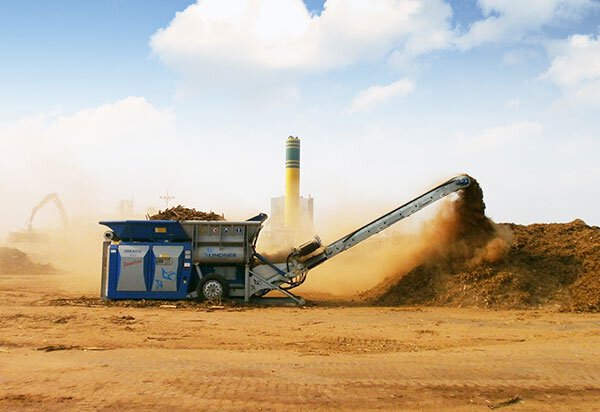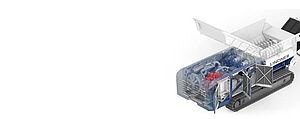Energy from Eucalyptus: A Task for Lindner’s Urraco 75
Udo Siebert, sales and service partner of Lindner Recyclingtech in Brazil, knows no better machine than Lindner’s all-rounder Urraco 75 to shred eucalyptus bark, which pulp and paper mills as well as wood panel producers in Brazil use to generate RDF to supply their own energy. A market with great potential.
They say that Curitiba is Brazil’s greenest city. As early as the 1970s the capital of Paraná state – situated on a plateau and with a population of approximately 1.8 million – invested in an ecological transport concept. Since then environmental and resource protection have been high on the agenda and that is why Lindner Recyclingtech decided that Curitiba was the perfect location for its business: seven years ago the Siebert & Cia company became Lindner’s sales partner in Brazil. When the Brazilian government banned the landfilling of eucalyptus bark, the demand for machines from the Urraco series rose. Two global leaders in pulp production and one renowned wood panel producer already use the tried-and-tested Lindner universal shredder in their plants: Eldorado Brasil in Tres Lagoas, Fibria in Aracruz and Fibraplac in Glorinha.

A relatively new method
According to Udo Siebert, the landfilling ban imposed two years ago promotes investments in energy recovery from eucalyptus bark, which is a relatively new concept: increasing numbers of Brazilian pulp and paper mills have their own waste-to-energy plants with production lines for RDF made of eucalyptus bark, which is a by-product of pulp production. It is not economically feasible to compost it: “It’s too expensive in Brazil”, explained the sales expert. The bark with low calorific value is shredded and then mixed with wood chips and other inert material, turning it into fuel with high calorific value that can then be used directly to generate energy in the producers’ plant kilns.
Eucalyptus is not an indigenous tree species that grows in the wild in Brazil, but it is used for forestry. Introduced 200 years ago from Australia and Tasmania, the largest eucalyptus plantations can be found today in south-eastern Brazil. It is estimated that four to five million hectares are cultivated in total in Brazil. The main buyers are the country’s pulp and wood panel producers. Usually it is only there that the tree trunks are barked for further processing. To shred the bark and produce RDF, Eldorado Brazil, Fibria and Fibraplac initially used other machines on the market; however, they proved prone to frequent faults, since the bark is put into the shredder with dirt and foreign objects (sand, stones, soil etc.) and not cleaned beforehand. That is done afterwards by other machines.
Killing two birds with one stone
On the hunt for a shredder unaffected by foreign objects, all three companies selected the mobile shredder Urraco 75 by Lindner with a 350 PS-strong AdBlue SCR diesel engine complying with Latin America’s emission standards. For Udo Siebert, this was not just a good, but the best choice: “I don’t know any two-shaft shredder on the market that is even unaffected by big stones. Also, the hydraulic reversing features make damage to the Urraco impossible. The shredding shafts feed the material into the machine efficiently and evenly. The way the shredding shafts interact means that bridging can be avoided.’
The two-shaft shredder’s design-inherent classic crushing process involving low shaft speeds minimises dust formation at the same time. The intelligent system with two tilting hoppers which can be inclined by as much as 80 degrees promote an optimum supply of feed material to the shafts. Depending on the shaft employed, the Urraco powerfully shreds – without damaging the material – wood, biomass, root wood, paper rolls, domestic and commercial waste, mixed construction waste, concrete sleepers, bulky waste, electronic and lightweight scrap, aluminium profiles, car bodies, and much more. And the clients in Brazil who produce RDF from eucalyptus bark are pleased with the shredder’s low wear and tear and low fuel consumption of 0.8 to 0.9 litres of diesel per ton of bark. Up to 300 tons of bark are processed daily in the producers’ plants. The Urraco 75 operates on average six hours a day and shreds the material to a grain size of 120 millimetres. The hourly output is 30 tons.
The Siebert & Cia team provides maintenance and repair services locally. Usually the Urraco shafts are serviced every 1000 operating hours – depending on the material and the amount of dirt in the input material. Upon request, monthly checks of the employed machines can be provided to prevent down time. Udo Siebert is very happy with the results achieved so far and has noticed increased market demand for Urraco. ‘I am quite sure we will further extend our leading position in this application’, as the Lindner sales partner recognises a unique selling point. And in the future Lindner shredders made in Austria might not only be sold in Brazil, but also in other South American countries where the topic of RDF is also becoming ever more important to kill two birds with one stone: waste and energy.

